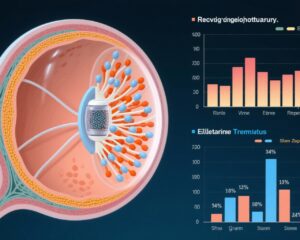Highlight
1. HER2 amplification/overexpression occurs in approximately 5% of RAS/BRAF wild-type metastatic colorectal cancers (mCRCs) and is associated with worse progression-free and overall survival.
2. HER2 mutations, although less common (2% of HER2-negative tumors), similarly link to poorer overall survival.
3. Neither HER2 amplification nor mutation status predicts benefit from chemotherapy combined with bevacizumab or anti-EGFR monoclonal antibodies.
4. These findings support HER2 alteration status as a negative prognostic factor, not predictive of biologic agent efficacy, in proficient mismatch repair (pMMR)/microsatellite stable (MSS) RAS/BRAF wild-type mCRC.
Study Background and Disease Burden
Colorectal cancer remains a major cause of cancer-related morbidity and mortality worldwide, particularly in metastatic settings where prognosis is poor. Among molecular alterations driving tumor biology, RAS and BRAF mutations are well-characterized predictive biomarkers for treatment selection with targeted agents. However, around 5% of RAS/BRAF wild-type metastatic colorectal cancers (mCRCs) harbor amplification or overexpression of Human Epidermal Growth Factor Receptor 2 (HER2). HER2, a receptor tyrosine kinase playing critical roles in cell proliferation and survival, is a validated therapeutic target in breast and gastric cancers. Its prognostic and predictive relevance in mCRC—especially concerning efficacy of biologics such as anti-EGFR monoclonal antibodies (cetuximab, panitumumab) and VEGF inhibitor bevacizumab—is still controversial. Furthermore, activating HER2 mutations occur in a subset of mCRC, though their impact has been insufficiently explored. Given the clinical importance of personalized medicine in mCRC, understanding HER2’s influence on outcomes and treatment response is crucial to optimize therapeutic decision making.
Study Design
This is a pooled, exploratory analysis of individual patient data from eight international randomized clinical trials (RCTs) investigating first-line chemotherapy plus either anti-EGFR agents or bevacizumab in untreated mCRC patients. The trials included were TRIBE2, TRIPLETE, VALENTINO, ATEZOTRIBE, PANDA, PANAMA, PARADIGM, and CALGB/SWOG80405. The total cohort comprised 1,604 patients with proficient mismatch repair (pMMR) or microsatellite stable (MSS) tumors confirmed RAS/BRAF wild-type status, and available HER2 amplification/overexpression data from tumor tissue samples. The evaluated endpoints were objective response rate (ORR), progression-free survival (PFS), and overall survival (OS). HER2 mutational status was also assessed in a subset of patients. Subgroup analyses were performed stratified by treatment regimen (chemotherapy plus bevacizumab versus chemotherapy plus anti-EGFR) and tumor sidedness (left vs. right). Statistical methods included hazard ratios (HR) with 95% confidence intervals (CI), odds ratios (OR), and interaction testing to evaluate predictive value of HER2 status on treatment efficacy.
Key Findings
Patient Characteristics: Of 1,604 patients analyzed, 81 (5%) were HER2-positive (HER2-pos) by amplification or overexpression. HER2 mutations were identified in approximately 2% of patients with HER2-negative tumors.
Survival Outcomes: HER2-pos patients demonstrated significantly shorter median progression-free survival (mPFS) of 9.8 months versus 12.2 months in HER2-negative (HER2-neg) patients (HR 1.31, P = .02). Similarly, median overall survival (mOS) was shorter at 28.0 versus 34.9 months (HR 1.37, P = .01), confirmed after adjustment for potential confounders (adjusted PFS P = .02, OS P = .048). HER2-mutant tumors also showed significantly poorer OS than wild-type HER2 (mOS 23.7 vs 34.4 months, HR 1.56, P = .04).
Response Rates: ORR was comparable between HER2-pos and HER2-neg groups (75% vs 72%, OR 1.21, P = .47), indicating HER2 status did not predict initial tumor shrinkage.
Effect of Biologic Agents: Interaction analyses revealed no significant modification of the effect of bevacizumab versus anti-EGFR therapies by HER2 status on PFS (Pint = .76), OS (Pint = .76), or ORR (Pint = .64). In particular, for left-sided HER2-pos tumors, outcomes with chemotherapy plus bevacizumab or anti-EGFR showed no statistically significant differences in PFS (9.8 vs 9.3 months, HR 0.73, P = .29), OS (29.8 vs 28.0 months, HR 1.29, P = .40), or ORR (59% vs 79%, OR 0.39, P = .10).
Biologic implications: HER2 amplification/overexpression and mutations appear to be prognostic markers associated with worse survival, but lack predictive value for efficacy of either bevacizumab or anti-EGFR agents in first-line mCRC therapy.
Expert Commentary
This comprehensive analysis represents the largest RCT-based evidence evaluating HER2 status in untreated pMMR/MSS RAS/BRAF wild-type mCRC, clarifying the prognostic and predictive roles of HER2 alterations. The absence of interaction with biologics suggests that current targeted therapy choices based on EGFR or VEGF inhibition should not be guided by HER2 amplification or mutation status in this setting. From a biological standpoint, HER2 activation may confer aggressive tumor behavior, explaining worse survival, but does not translate into resistance or sensitivity to anti-EGFR or anti-VEGF strategies. Limitations include the exploratory nature and relatively small HER2-pos subgroup size, although pooling eight RCTs strengthens the robustness. The role of emerging HER2-targeted agents—such as trastuzumab, tucatinib, and other novel anti-HER2 therapeutics—remains to be defined and may change clinical approach in the future. Current guidelines do not recommend routine HER2 testing to select first-line biologic therapies but counseling regarding HER2 status can inform prognosis. Future studies should investigate integration of HER2-targeted treatments in mCRC with these molecular profiles.
Conclusion
HER2 amplification/overexpression and HER2 mutations are present in a small subset of RAS/BRAF wild-type metastatic colorectal cancers and serve as negative prognostic markers in proficient mismatch repair/microsatellite stable tumors. This large exploratory analysis demonstrates that HER2 status does not predict differential benefit from first-line chemotherapy combined with bevacizumab or anti-EGFR monoclonal antibodies. Pending approval and incorporation of HER2-targeted therapies, HER2 alterations should primarily inform prognosis rather than choice of current biologic agents. These findings underscore the necessity of ongoing research to optimize molecularly tailored strategies for mCRC patients.
References
Germani MM, Borelli B, Hashimoto T, Nakamura Y, Oldani S, Battaglin F, Bergamo F, Salvatore L, Stahler A, Antoniotti C, Shitara K, Venook A, Oki E, Muro K, Ugolini C, Soeda J, Lonardi S, Pietrantonio F, Lenz HJ, Modest DP, Yoshino T, Cremolini C. Impact of Human Epidermal Growth Factor Receptor 2 in Patients With Metastatic Colorectal Cancer Treated With Chemotherapy Plus Bevacizumab or Anti-EGFRs: Exploratory Analysis of Eight Randomized Trials. J Clin Oncol. 2025 Sep 4:JCO2501003. doi: 10.1200/JCO-25-01003
Additional cited sources:
Van Cutsem E et al. ESMO Consensus Guidelines for the management of metastatic colorectal cancer. Ann Oncol. 2016;27(8):1386-422.
Mao M et al. HER2 as a therapeutic target in colorectal cancer: Is it the time to reconsider? Oncologist. 2021;26(4):e617-e627.
Merath K et al. Prognostic and predictive value of HER2 and HER3 expression in colorectal cancer: A systematic review and meta-analysis. Cancer Treat Rev. 2020;91:102111.



